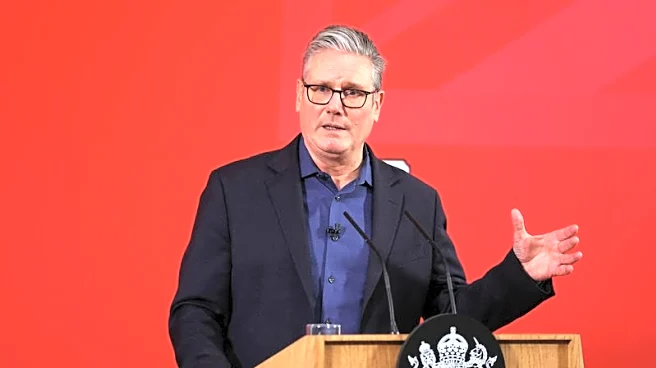What's Happening?
Washington has proposed a 20-point outline aimed at resolving the Israeli-Palestinian conflict, focusing on phased Israeli withdrawals, hostage releases, and a humanitarian surge. The plan includes establishing an administrative mechanism for Gaza that is neither controlled by Hamas nor Israel. This proposal follows a ceasefire between Israel and Hamas in Gaza, which went into effect recently. The initiative is seen as a potential pathway to peace, with significant implications for the future of the region. The plan's details were highlighted during a demonstration in Tel Aviv, where a placard featuring President Trump was displayed, symbolizing U.S. involvement in the peace process.
Why It's Important?
The proposed Gaza deal is significant as it represents a comprehensive approach to addressing longstanding issues between Israel and Palestine. By facilitating phased withdrawals and humanitarian efforts, the plan aims to reduce tensions and improve living conditions in Gaza. The establishment of a neutral administrative mechanism could pave the way for more stable governance in the region, potentially reducing the influence of extremist groups like Hamas. This initiative could also strengthen U.S. diplomatic ties in the Middle East, showcasing Washington's commitment to peace and stability. The success of this plan could lead to broader regional cooperation and set a precedent for resolving other conflicts.
What's Next?
The next steps involve diplomatic negotiations to refine and implement the 20-point outline. Key stakeholders, including Israeli and Palestinian leaders, will need to engage in discussions to address concerns and ensure mutual agreement on the plan's components. International support and monitoring may be required to facilitate the phased withdrawals and humanitarian efforts. The establishment of the administrative mechanism for Gaza will be crucial, requiring collaboration between various parties to ensure its effectiveness and neutrality. Continued U.S. involvement and leadership will be essential in guiding the process and maintaining momentum towards peace.
Beyond the Headlines
The Gaza deal proposal could have deeper implications for regional politics and international relations. It may influence the dynamics of U.S. foreign policy in the Middle East, potentially altering alliances and power structures. The plan's focus on humanitarian efforts highlights the importance of addressing socio-economic issues as part of conflict resolution. Additionally, the initiative could serve as a model for other international peace efforts, demonstrating the effectiveness of comprehensive, multi-faceted approaches to complex geopolitical challenges.










